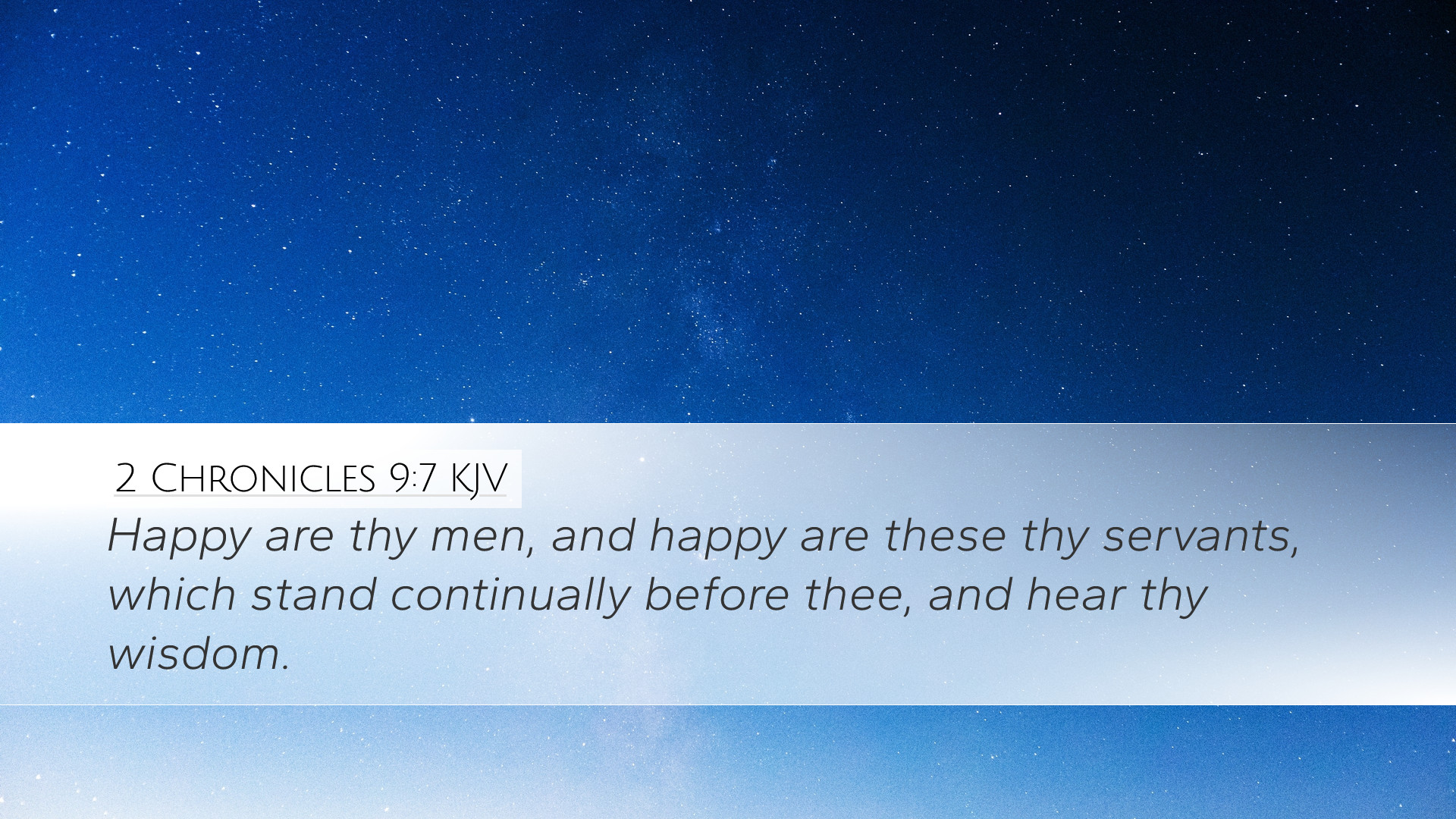Commentary on 2 Chronicles 9:7
Text of the Verse: "Happy are thy men, and happy are these thy servants, which stand continually before thee, and hear thy wisdom."
Introduction
This verse is part of the narrative that details the visit of the Queen of Sheba to King Solomon. It underscores the happiness and privilege of those who serve in close proximity to a wise ruler. Drawing upon insights from renowned public domain commentaries, this exposition aims to provide meaningful interpretations for pastors, students, theologians, and Bible scholars.
Contextual Background
The account of the Queen of Sheba visiting Solomon can be found in both 1 Kings 10 and 2 Chronicles 9. The Queen, intrigued by Solomon's renowned wisdom and wealth, traveled to test him with difficult questions. This visit serves to highlight Solomon's reputation and the grandeur of his kingdom, demonstrating God's favor upon him.
The Significance of Happiness
In this verse, the emphasis is placed on the idea of happiness. Matthew Henry notes that true happiness is found in the company of those who are in the service of God and wise leaders. The joy experienced by Solomon's men and servants serves as a testament to the benevolent governance of their king.
Happiness of the Men
Albert Barnes elaborates that the happiness of Solomon's men indicates a harmonious and blessed environment. They are not merely instruments in the machinery of the kingdom; rather, they are fulfilled and joyful due to the righteous leadership they serve under.
Happiness of the Servants
From Adam Clarke's perspective, the servants represent those who are dedicated to the daily operations of the kingdom. Their continual presence before Solomon signifies not only their loyalty but also their privilege of being witnesses to divine wisdom.
Wisdom and Its Impact
The latter part of the verse highlights the centrality of wisdom in promoting happiness among Solomon's court. The service of these men is twofold: they benefit from Solomon's wisdom while simultaneously contributing to its dissemination.
Hearing Wisdom
According to Henry, the constant proximity to wisdom creates a transformative effect on the servants. They are depicted not as mere spectators but as active participants in a life shaped by divine insight.
Listening as a Form of Service
Barnes notes that the act of hearing wisdom is a crucial facet of their service. It reflects the idea that a wise leader imparts not just knowledge but also moral and spiritual guidance, enriching the lives of those around him.
Lessons for Today's Leaders
This verse offers timeless lessons for contemporary leaders and communities of faith. The contentment of Solomon's men symbolizes the overall well-being associated with leadership that values wisdom and discernment.
The Role of Leaders
Adam Clarke emphasizes that leaders should strive to create environments where their followers can experience happiness and fulfillment, recognizing the profound influence of wise governance.
Creating a Wise Community
Leaders are tasked with fostering a culture where wisdom is pursued, shared, and celebrated. The principle of continual listening and learning is essential for those in positions of influence.
Theological Insights
This verse serves as a theological reflection on the nature of servanthood in the kingdom of God. The happiness derived from service reflects a divine order where wisdom leads to peace and joy.
Servants of God
In the New Testament context, all believers are called to serve, and their joy comes from living in alignment with God’s purposes. Henry connects this to the joy of those who serve Christ, indicating that happiness is a fruit of righteousness.
Calling to Serve
Every believer is called to be a servant, standing continuously in the presence of Christ. Just as the servants before Solomon found happiness in their service, so too can believers today find joy in their spiritual journeys.
Conclusion
2 Chronicles 9:7 encapsulates the joy and privilege of those who stand before a wise ruler. The combined insights from various public domain commentaries underscore the importance of wisdom in leadership and the transformative happiness it brings to both leaders and servants. As we reflect on this verse, it becomes clear that the principles of godly leadership and the joy that springs from such service remain relevant and instructive for all who seek to lead and serve well in the present day.


